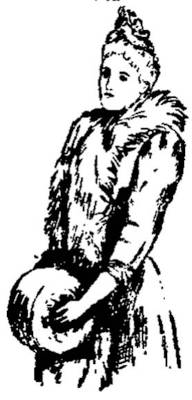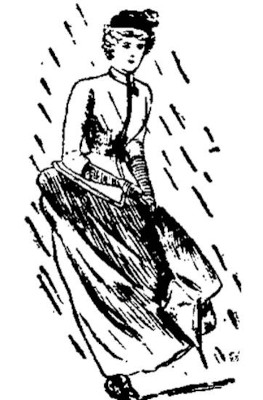This article has been transcribed from a copy of the Cardiff Times in the online collection of scanned Welsh newspapers 1804-1919 in the National Library of Wales, with grateful recognition of the free access accorded to all readers.
Explanatory Notes
This is a typical piece of motivational writing of the period, enjoining readers to rise above the circumstances they find themselves in.
The quotation from the 'late Earl of Beaconsfield' (Benjamin Disraeli) is from his novel Vivian Grey (1826-27) Book 6, chapter 7. —— David Skilton

t is a popular notion that man is the creature of circumstances, and that his life and actions are dependent upon those accidental and unforeseen combinations of life of which circumstances exist. [?consist]
This may or may not be the case. The late Earl of Beaconsfield, who had much knowledge of life, said 'Man is not the creature of circumstances; circumstances are the creatures of men. We are free agents, and man is more powerful than matter.'

Don’t' Believe Circumstances Alter Cases
Yet men are not unfrequently ruled by circumstances. The difficulty about circumstances [is] that they are, for the most part, an unknown quantity, and turn up when least expected, and in some form not anticipated by those they most concern. They are things to be taken advantage of by someone, and prove to the full the truth of the old adage that 'what is one man's meat is another man's poison.'
The circumstance which raises one man to wealth may be the means of reducing some other man to poverty. There is no relying upon circumstances they are as erratic as the weather.
The idea of man being the victim of circumstances may be dismissed on the grounds that circumstances are very often made of men such as affect the world of commerce.

In Good Circumstances
Take for instance the case of a man who has heavy dealing in stocks and shares. His slightest action may so alter the circumstances of the market that thousands of pounds may be lost in an incredibly short space of time. It is his action that rules circumstances, and not circumstances which rule his action.
So with the politician who attains eminence. He pulls the strings of office, and the circumstances of the political world are changed at once, and war or peace may at times result from the circumstances his action produces. If a man finds the circumstances surrounding him about to change he at once plans his affairs so that can makes them fit in with the change, and thus, as it were manipulates the circumstances to suit his own requirements. These are the men who do not become what are known as the 'victims of circumstances.'

In Bad Circumstances
Anyone who becomes entitled to the appellation named above has generally his own want of aptitude to thank for any reverses he meets with[.] Circumstances are things which require grasping and dealing with in much the same way as do opportunities.
The far-seeing man may often forsee a change in circumstances before it comes, and he is thus enabled to grapple with them when they come into such prominence that they affect his well-being, or such places and schemes as he may have in hand at the time.
All men who have reached any position in life have generally been able to govern circumstances, and to turn them to the fullest advantage for their own benefit.
How many men have lifted themselves from 'poor circumstances' to prosperity by the mere fact that they watched surrounding circumstances and made the most of the opportunities they provided.

A Victim of Circumstances
The man who is popularly said to have 'had his chance' and taken it has done nothing more than utilised such circumstances as he saw lent themselves to his own advantage.
If people generally would give up the habit of thinking that men are governed by circumstances there would be fewer failures in the world and fewer complaints from men that 'circumstances were against them.' In whatever form they come circumstances can be manipulated if those they concern will only look them sensibly in the face, and make the best of them instead of letting them slide and then sitting down and bemoaning their fates.
Last modified 26 April 2022